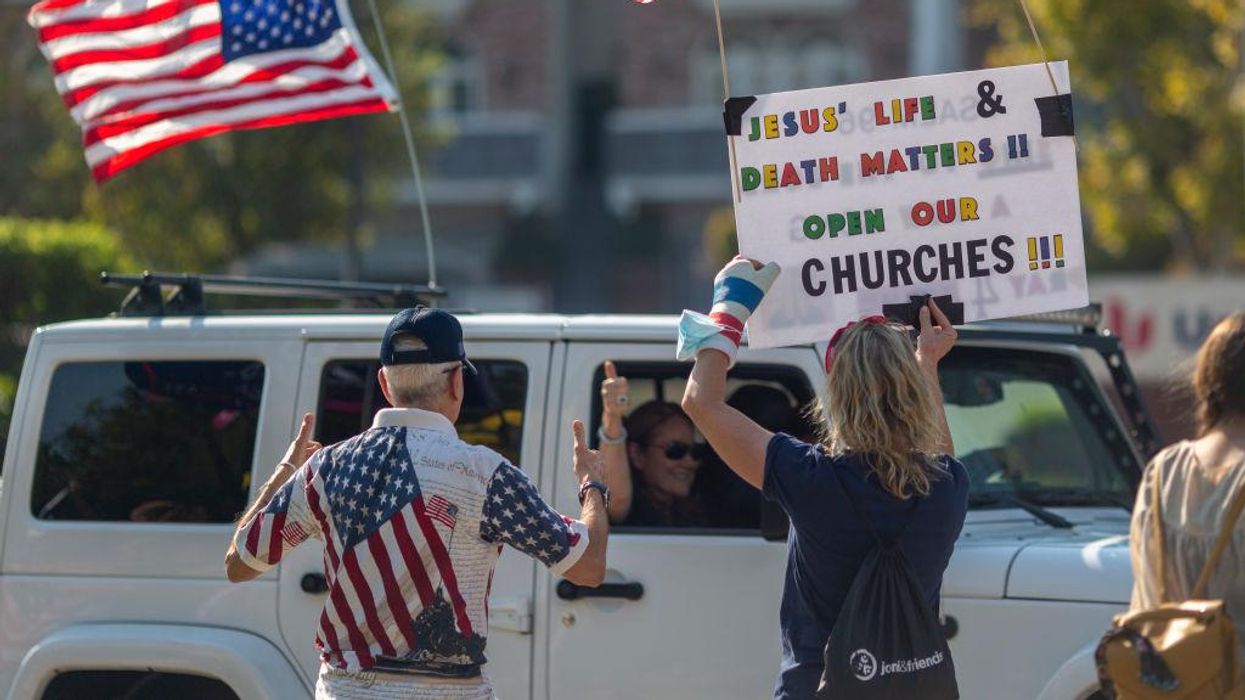
David McNew/Getty Images

'Assuming all of the same precautions are taken, why can someone safely walk down a grocery store aisle but not a pew?'
A California judge on Thursday temporarily blocked Democratic Gov. Gavin Newsom's coronavirus restrictions on worship services, which critics say unconstitutionally discriminate against people of faith.
Judge Gregory Pulskamp's ruling imposed an injunction against enforcement of California's planned COVID-19 restrictions on houses of worship, citing the recent Supreme Court decision that struck down New York's COVID-19 rules for churches as unconstitutionally discriminatory.
Newsom's new stay-at-home order separates California into five regions and activates when a particular region's remaining ICU capacity falls below 15%. When in effect, the order bans indoor worship services while permitting retail businesses to operate indoors at 20% capacity.
In September, attorneys with the Thomas More Society filed a lawsuit on behalf of Father Trevor Burfitt, a California priest, challenging Newsom's authority to issue his emergency lockdown orders.
Judge Pulskamp said that Newsom's lockdown failed to treat houses of worship as "equal to the favored class of entities," those being "entities permitted to engage in indoor activities — also known as 'essential businesses' or 'critical infrastructure' — includ[ing] big-box retail stores, grocery stores, home improvement stores, hotels, airports, train stations, bus stations, movie production houses, warehouses, factories, schools, and a lengthy list of additional businesses."
The judge found that California's argument for permitting some secular activity while outright banning indoor religious activity was not persuasive.
However, Defendants' efforts to distinguish the permitted secular activity from the prohibited religious activity are not persuasive. For example, Defendants contend that the congregations of shoppers in big-box stores, grocery stores, etc., are not comparable to religious services in terms of crowd size, proximity, and length of stay. To the contrary, based on the evidence presented (or lack thereof) and common knowledge, it appears that shoppers at a Costco, Walmart, Home Depot, etc. may – and frequently do – congregate in numbers, proximity, and duration that is very comparable to worshippers in houses of worship. Defendants have not convincingly established that the health risks associated with houses of worship would be any different than "essential businesses" or "critical infrastructure," assuming the same requirements of social distancing and the wearing of masks were applied across the board. …
In addition, the restrictions at issue in this case are not "narrowly tailored" because the occupancy limits imposed on places of worship by the Purple Tier of the Blueprint for a Safer Economy and the Regional Stay at Home Order are zero – a total and complete ban of indoor religious services. These restrictions are arguably harsher than any other set of restrictions considered by the courts in all of the cases cited by the parties in this action. In Roman Catholic Diocese, the court considered New York's religious services occupancy limits of 10 persons in "Red Zones" and 25 persons in "orange zones" to be "very severe restrictions" and "far more restrictive than any Covid-related regulations that have previously come before the Court [footnote omitted], much tighter than those adopted by many other jurisdictions hard-hit by the pandemic, and far more severe than has been shown to be required to prevent the spread of the virus at the applicants' services." (Roman Catholic Diocese, supra, at p. 1, 2.) What then should the courts think of California's total ban on indoor services? "Narrowly tailored" regulations mean "the least restrictive means available" and may potentially include a variety of less draconian measures such as "social distancing, wearing masks, leaving doors and windows open, forgoing singing, and disinfecting spaces between services." (Roman Catholic Diocese, supra, at p. 4 (conc. opn. of Gorsuch, J.).) Therefore, it seems highly probable that Plaintiffs will prevail in this case should the matter proceed to trial.
Quoting Supreme Court Justice Brett Kavanaugh from his dissent in South Bay United, Pulskamp slammed restrictions on churches as absurd.
"Assuming all of the same precautions are taken, why can someone safely walk down a grocery store aisle but not a pew? And why can someone safely interact with a brave deliverywoman but not with a stoic minister? … The State cannot 'assume the worst when people go to worship but assume the best when people go to work or go about the rest of their daily lives in permitted social settings.'"
The judge's ruling will temporarily block California from enforcing its restrictions on indoor worship until a full trial can be conducted.
Reacting to the decision, attorneys from the Thomas More Society praised the outcome and the Supreme Court's decision in Brooklyn Diocese v. Cuomo for defending religious liberty.
"After more than nine months of tyranny in the name of 'containing the spread' of a virus they have failed to contain, the gubernatorial dictators presiding over draconian lockdowns are running out of runway on their claim that churches are somehow more dangerous viral vectors than any of the litany of 'essential businesses' crowded with customers that they allow to operate at 100% capacity," Thomas More Society special counsel Christopher Ferrara said.
"The Supreme Court's decision in Brooklyn Diocese v. Cuomo has opened the way to the liberation of churches from the absurd and bigoted superstition that they are veritable death chambers threatening the entire population. Not even hair salons, which by the services offered necessitate close personal contact, have been subjected to the onerous and barefaced biases heaped upon houses of worship," Ferrara stated.
"We are deeply grateful to Judge Pulskamp for his recognition that, as his decision states (quoting Brooklyn Diocese): 'But even in a pandemic, the Constitution cannot be put away and forgotten," Ferrara continued. "The restrictions at issue here, by effectively barring many from attending religious services, strike at the very heart of the First Amendment's guarantee of religious liberty. Before allowing this to occur, we have a duty to conduct a serious examination of the need for such a drastic measure.'"
(H/T: Hot Air)